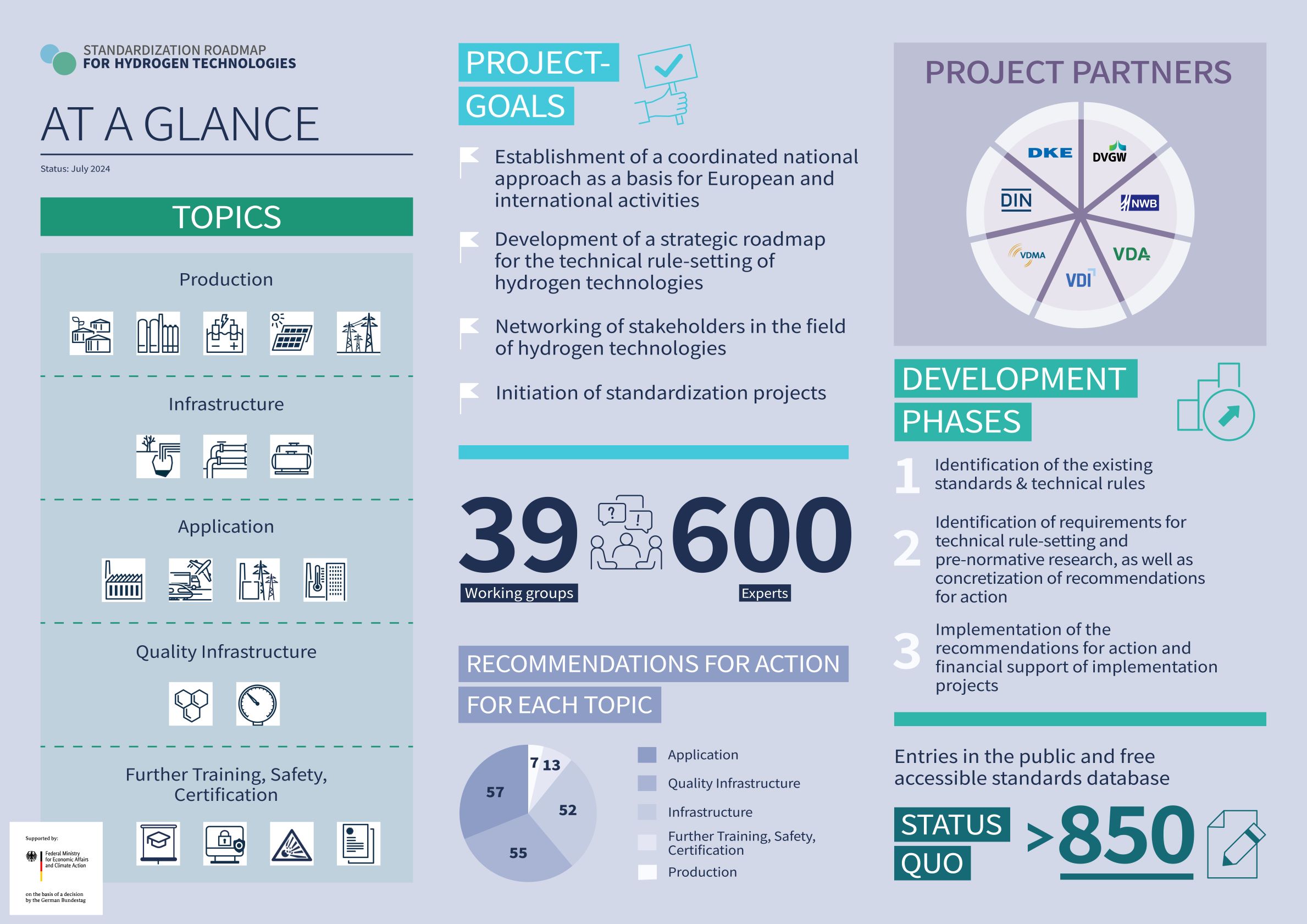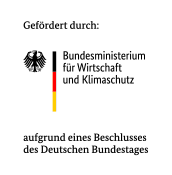Publication of the hydrogen technologies standardization roadmap
On 25 July 2024, after almost one and a half years of development, the results of the Standardization Roadmap for Hydrogen Technologies 2024 were presented at a virtual event. For the first time, the Standardization Roadmap for Hydrogen Technologies represents a nationally coordinated strategic roadmap for the technical regulation of hydrogen technologies and defines guidelines for establishing and further developing the technical regulations in this area. The roadmap, which was drawn up on behalf of the Federal Ministry of Economic Affairs and Climate Action (BMWK), contributes significantly to the demand for uniform standards for the development of a hydrogen infrastructure, which is addressed in the updated national hydrogen strategy of the German government.
You can download the complete Standardization Roadmap for Hydrogen Technologies or a management summary here.
Reproduction notice: The results and files of the joint project Standardization Roadmap for Hydrogen Technologies can be used with the following citation: Project partners Standardization Roadmap for Hydrogen Technologies, 2024, Standardization Roadmap for Hydrogen Technologies 2024, https://www.din.de/de/forschung-und-innovation/themen/wasserstoff/normungsroadmap-wasserstoff/veroeffentlichung
Note: The publication event was held in German. Please activate auto-generated English subtitles.
Topics and results
This Roadmap outlines the results of the work and discussions along the entire value chain and provides a comprehensive overview of the status quo, current challenges, the need for action and the specific steps required in the development of the technical regulations.
The results of the Roadmap are subdivided into the five fields of action considered along the hydrogen value chain:
- Production
- infrastructure
- Application
- Quality Infrastructure
- Further Training, Safety, Certification
In addition to the 180 or so recommendations for action, the list of standards and technical regulations for hydrogen technologies has also been published, which contains over 850 entries on the regulations that are already available and/or applicable to hydrogen and will continue to be maintained and updated.
Discover the Standards Database for Hydrogen Technologies now

Implementation projects
As part of the Standardization Roadmap for Hydrogen Technologies, high-priority projects for technical regulations are financially supported based on the recommendations of the committees and working groups of the Roadmap. Since October 2023, 23 projects have already been initiated. Currently, 22 applications for further projects are being reviewed by the committees and working group of the Roadmap. There will be two further rounds of initiation before the end of the project term.
Further development: Standardization Roadmap for Hydrogen Technologies 2025
The joint project will further work on and specify the existing roadmap in order to further advance the development of the quality infrastructure for hydrogen. In the coming years, an increase of the results from various research projects and practical experience will also enable the adaptation and expansion of the technical regulations. The NRM H2 will also support the implementation of the technical regulations with its network of experts. Furthermore, the progress of standardization activities and technical regulation activities at national, European and international level will be closely monitored and taken into account accordingly. These developments and the further elaboration of recommendations for action to close existing gaps, especially in areas that are currently still at a low level of development, will be presented in the second version of the hydrogen technology standardization roadmap. The final standardization roadmap for hydrogen technologies will be published at the end of 2025. Interested experts are cordially invited to participate in the further development.
Overview of the status quo and identified gaps for technical regulations
The collection of technical rules for the use of components in infrastructure is almost complete. The gaps are currently being closed with the support of the Standardization Roadmap. In the area of applications and technologies, there are already many national certification schemes that make it possible to place products on the market on the basis of EU regulations. The remaining gaps will be closed in the near future and the existing national technical rules must be harmonized at European level in the next steps.
The level of maturity of the existing technical rules for the production of hydrogen by water electrolysis is relatively advanced. However, there are still gaps in terms of uniform evaluation criteria and international harmonization. Other types of hydrogen production, such as those through biological fermentation, photosynthetic, or thermochemical processes, are still in the early stages of development and no corresponding standards exist.
Based on their use as chemical products, a large number of standards and technical rules exist for liquid, cryogenic hydrogen (LH2) and hydrogen derivatives (e.g., NH3, methanol, LOHC). New regulations must be developed to meet the requirements for wider use as an energy source and storage medium. Successful market ramp-up requires more pre-normative research and uniform, publicly accessible standardization.
Existing technical rules can be used for total system integration - the economically efficient and grid-friendly interaction of the electricity, heat and gas infrastructures. However, the collection of technical rules must now be expanded, for example by implementing uniform communication standards to ensure a fluid, cross-sectoral exchange of data and to enable the integration of hydrogen production and utilization facilities into the existing energy system.
Many power plant and industrial hydrogen applications are already operational and state of the art. The majority of existing standards usually require little or no adaptation to integrate safety requirements and other influences of the market ramp-up, such as new or improved technologies, into existing standards
In the field of measurement technology, there are already a large number of applicable technical rules for analysis, measurement and billing. The corresponding analysis, measuring device and meter standards are currently being developed or revised. Procedures for calibration, verification of precision and online gas analysis also need to be adapted in order to comply with the guidelines and specifications of the calibration and measurement regulations.
In the area of mobility, the level of normative coverage varies greatly.
A large number of standards already exist for filling systems, but there are still some gaps to be filled in order to develop all the necessary filling system standards for safe hydrogen mobility.
In shipping, the existing DIN, EN and ISO standards and ship-related technical rules for inland and maritime shipping are being reviewed, supplemented and further developed to include hydrogen and its derivatives for use as a fuel. In addition to the use of hydrogen as an on-board fuel, the ship-shore interface and ship-side storage for transportation are also taken into account.
The use of hydrogen in road transport is well covered by standards, and there are only a few gaps in standards and technical rule collections.
The first technical rules in the electrotechnical field have been issued for rail vehicles. In addition, standards from other sectors are used because they are interface technologies. Rail-specific requirements for refuelling, storage and safety aspects are currently being focused on. As there are currently hardly any standards and technical rules in the aviation sector, there is a need for standardization in several areas, such as refuelling, test methods and cleanliness of the hydrogen used.
Existing technical rules can be used for special vehicles; the challenge here is to work out specific standardization requirements, as further developments are currently still unclear.
Already a large number of standards exist making it possible to certify products that use hydrogen. For plant technology and production international standards are available.. There are also already a large number of certification schemes that can be applied nationally in order to meet the European legal requirements for the approval of products until the corresponding European Standards for hydrogen have been revised. Nevertheless, there are still considerable gaps that need to be closed in the coming years in order to accelerate the market ramp-up and standardize approval.
For safety- and security-related aspects, including cyber security, there are already a large number of technical rules that define requirements for specific fields of application. The new and broader application of hydrogen technologies results in additions and changes to the relevant safety standards and technical rules, including for operational explosion protection, the handling of cryogenic hydrogen and the evaluation of safety concepts for manufacturers, operators and licensing authorities.
A large number of technical rules exist for stationary and mobile pressure vessels, some of which need to be adapted to the new requirements of a mass market. New technologies must also be accompanied by standards and technical rules, which must be developed for better market access, thereby taking into account safety, economic efficiency and technological openness. In the area of underground gas storage facilities, an existing set of technical rules for the natural gas sector can be used as a basis. The technical rules need to be expanded in line with the requirements for hydrogen applications, and the conditions specific to underground gas storage facilities need to be taken into account.
The topic of fuel cell energy systems is well covered by standards, many of which are already available in a revised version. For thermal power plants, the existing technical rules need to be expanded to include the specific requirements for hydrogen applications., e.g. in the area of combustion technology.
An almost complete set of technical rules is available for the grid-based supply of hydrogen. The gaps, for example the adaptation of operating processes to hydrogen or the harmonization and specification of uniform training content for handling the medium hydrogen by employees, were identified as part of the Standardization Roadmap and will now be closed in a timely manner. Some of the technical rules are already entering the next iteration of revision in order to further develop the state of the art with the findings from research projects.
In the field of heat supply, already many safety and product standards exist dealing with appliance components. Many national certification schemes make it possible to bring technologies onto the market. For equipment technology, the current standards at European level and the installation and application technical rules still need to be adapted.
The core standards for specifying the quality and composition of hydrogen (blends) for applications are available. At national level, the same applies to transmission - although these standards still need to be raised to European or international level in order to ensure international connectivity. There are many specific requirements in the area of verification and sustainability aspects, but these have not yet been harmonized with the regulations.
Qualified personnel are needed for the market ramp-up of hydrogen. The necessary knowledge can be imparted on the basis of existing technical rules. Hereby, it is essential that the qualification requirements are adapted to hydrogen. What is particularly important is to break down the historically evolved and non-transparent legal framework in order to clearly define the necessary qualifications for the specific field of work. The requirements must be set sufficiently high without creating market barriers.
For metallic materials, composites and plastics, the existing technical regulations must be partially revised for the use of hydrogen and identified gaps must be closed, in particular the definition and validation of test methods and measurement technology, and the description of material behavior when exposed to hydrogen.
About the project

The collaborative project "Standardization roadmap for hydrogen technologies" is a collaborative initiative of the German Institute for Standardization (DIN), the German Commission for Electrical, Electronic & Information Technologies (DKE), the German Technical and Scientific Association for Gas and Water (DVGW), the German Association for Standardization and Railway Development (NWB), the German Association of the Automotive Industry (VDA), the Association of German Engineers (VDI) and the German Engineering Federation (VDMA).


